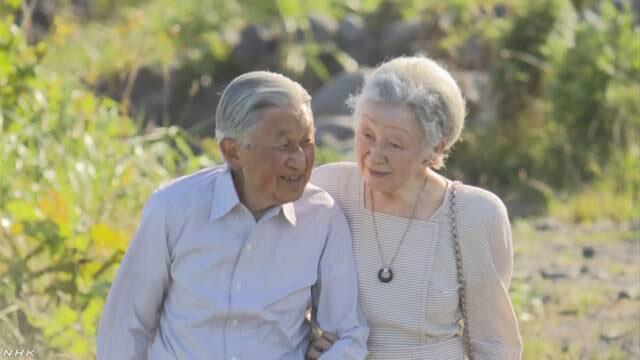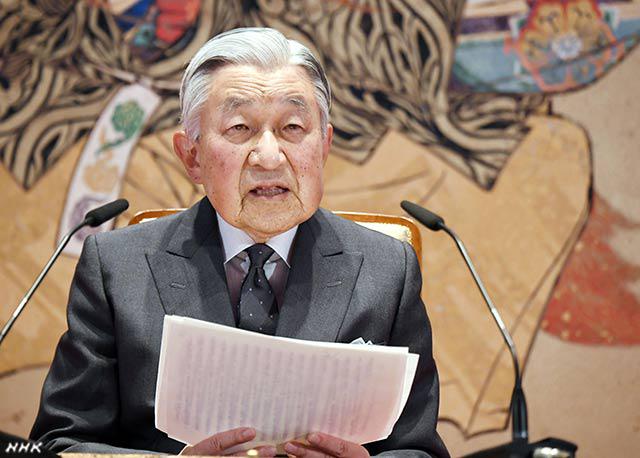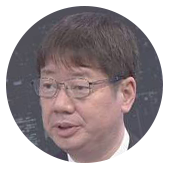The decision
Emperor Emeritus Akihito always believed that "the Emperor must be fully capable of carrying out his duties as the symbol of the State stipulated by the constitution while he is on the throne." Once it became difficult for him to fulfill his duties, he believed it was his duty to step down.
On August 8, 2016, Emperor Emeritus Akihito delivered a public video message in which he said that as he aged and his physical condition declined, he believed it would be difficult for him to continue to fulfill his role in the future. He expressed an apparent wish to abdicate.
His dilemma was a reflection of Japan's rapidly graying society.
The announcement was a shock to the country. But many people sympathized and supported the decision, in large part due to the devotion he had always shown to the role.

My reaction
I first heard about the Emperor's thoughts to abdicate from a source.
"The Emperor wants to abdicate and it's possible there will be big changes in the Imperial Household in the coming years."
I was floored. This was a completely different story from what I had been hearing as an imperial correspondent for decades. But this was coming from a source I knew had a deep understanding of the Emperor's thoughts.
I brought up the potential abdication with another source and got a sharp reaction. I was told only a few people knew about this and was warned not to report on it because it would undermine the Emperor's wish. I knew then that this was going to be a huge story with historic implications.
At the time, Emperor Emeritus Akihito was over 80 years old. Senior Imperial Household Agency staff had advised him on several occasions to reduce the number of his official duties but he always refused. He was steadfast in his commitment.
For this reason, imperial reporters like me had been worried that the Emperor Emeritus might be determined to keep working until the moment he collapsed.
But after hearing his thoughts, I got a better understanding of his attitude. At the same time, I wondered whether an abdication would be possible, as it is something that's not considered in the modern Japanese imperial system.
Inner struggle
While the Emperor Emeritus wanted to publicly announce his wish as soon as possible, there were some people close to him who wanted him to change his mind. But senior Imperial Household Agency officials and aides knew that once he made up his mind, the Emperor Emeritus was not one to change it.
Empress Emerita Michiko had a difficult time understanding her husband's wish at first, but later became supportive.

In the year before the video message, the agency quietly approached the Prime Minister's office and began making preparations. One of the original ideas was for the Emperor Emeritus to announce his thoughts on his birthday in December, but that was shelved. The Imperial Household Agency and the Prime Minister's office continued discussions on when to make a public announcement.
Because the Imperial system is part of the constitution, it is difficult for an Emperor to express opinions on it.
But the Emperor Emeritus was worried that the Japanese people would not understand his thoughts if he did not speak to them directly. Empress Emerita Michiko often spoke about this on his behalf to senior agency officials.
NHK first reported on the Emperor Emeritus' wish to abdicate when his public address was still being polished. Sources tell me that as reports began to circulate, people expressed their support, and the draft was changed to more definitively reflect his thoughts. In that sense, the understanding and sympathy of the Japanese people emboldened the Emperor to clearly state his thoughts.
When did thoughts of abdication begin?

Taichiro Mitani, former advisor to the Imperial family, says he first learned about the Emperor Emeritus' wish to abdicate back in July 2010 at a meeting at the Imperial Palace. The Emperor Emeritus had already revealed his wish to the Grand Steward of the Imperial Household Agency, as well as Empress Emerita Michiko and their sons, current Emperor Naruhito and Crown Prince Akishino.
"His Majesty probably thought about the matter for a long time," says a former aide. "I think he gradually reached the conclusion that he had to abdicate and when he spoke at the meeting of advisors, his mind was already set."
There were two formative experiences behind his decision. One was seeing his father, Emperor Showa, battle illness, almost to the point of unconsciousness in the months prior to his death, while still on the throne. The second was watching his mother, Empress Kojun, weaken in her later years.
Choosing the appropriate time to abdicate
Though his wish was kept private, the Emperor Emeritus seems to have wanted to abdicate in the spring of this year, at around the turn of the fiscal year. When he first told his aides he wanted to step down, he is said to have suggested he was willing to remain on the throne until he was 80. As discussions continued, he is said to have vowed to "keep trying hard until the 30th year of Heisei."
The 30th year -- which was last year -- was the year in which he would turn 85. Around the time of the video message, he had come around to the idea of abdicate at the turn of the fiscal year in the 31st year. This was in part due to ceremonies planned to mark the 30th anniversary of the death of Emperor Showa in January. The Emperor Emeritus appears to have wanted to carry out these ceremonies himself.
Meanwhile, Empress Emerita Michiko appears to have raised the possibility of her husband abdicating a year earlier, at the turn of the fiscal 2018. As the person who has been at the Emperor Emeritus' side for decades and knows him better than anyone, she probably had a sense of how he was aging. But in the end, the abdication was set for 2019. It's likely the time that the next emperor would need to prepare was taken into consideration.

Observers have noted how in the past few years, the Emperor Emeritus had begun to make mistakes while reading messages or carrying out duties. Because of his belief that it was his responsibility to abdicate when he could no longer fulfill his role, he may have thought that this year was his last chance to do so on these terms.
The Empress Emerita's constant support
"I know little of the ways of the world and am worried that I lack consideration for others. I would like to be helped by someone who is warm in heart and deeply compassionate."
These are the words of a young Emperor Emeritus Akihito. He found that someone in Empress Emerita Michiko.
In a news conference on the occasion of the 50th anniversary of their marriage, the Emperor Emeritus presented a poem:
"As I continue
My talks with her,
I become aware
That, in my heart,
A window is opening."
The Emperor Emeritus fulfilled his role through his "window", the Empress Emerita. Aides say she is "the person who best understands" him.
The Emperor Emeritus apparently discusses everything with his wife. In everyday life, she has always looked after his health, including having significant input into his meals.
In February of this year, at a ceremony celebrating 30 years of his reign, the Emperor Emeritus misread his prepared remarks. The Empress Emerita noticed and immediately told him the correct words. It was likely that she had memorized the remarks herself. It was a touching scene that underscored the big role she has played during her husband's reign.

Symbol of the State
The Emperor Emeritus' goal during his reign was to "keep the Japanese people in his heart, share their joys and sadness, and pray for their happiness." He carried out many official duties, saying there were things he had to do in addition to the "State acts" stipulated in the Constitution.
One of them was confronting Japan's World War II history. Japan's part in the conflict was started in the name of his father, the late Emperor Showa.
The Emperor Emeritus was a child during the war and he saw large parts of Tokyo reduced to ashes. His former aides say this firsthand experience of war was a large reason for his commitment to the cause during his reign.
He believed there were two pillars to his duty. One was to mourn the victims and empathize with the sorrow of bereaved families. The second was to pray for peace and accurately hand down the memories of war to future generations.

The Emperor Emeritus saw the war dead not as a number or statistic, but as part of the tragic reality of the loss of life. He mourned for them as individuals. He listened to the stories of former soldiers and tried to convey and preserve their memories.
Another duty he considered especially important was turning his thoughts to people in difficult situations. One example is his visits to disaster-hit areas.
"They became restless when massive disasters occurred," says an aide.
The Imperial couple visited disaster zones, listened to survivors talk of sadness and hardship, and shared in these feelings. I think they understood that people in times of hardship are comforted when they have someone to talk to.
Public opinion
An NHK survey shows that Japanese people's views on the Emperor drastically changed when the era changed from Showa to Heisei. The survey started in 1973 and is conducted every five years. No major changes were seen during Showa. But in the fifth year of Heisei, the number of people who said they had a favorable impression of the Emperor doubled.


Two years earlier, the Emperor Emeritus and the Empress Emerita visited areas devastated by a volcanic eruption. They kneeled on the floor of a shelter and gave words of encouragement to evacuees. Their acts of compassion seemed to have changed public perception of the couple. The percentage of respondents with favorable impressions of the Emperor Emeritus remained high in the following years. In the later Heisei years, the number of people who said they feel respect for the Emperor surged. In last year's survey, the figure was double that from the survey taken in early Heisei.
The percentage of people who felt respect for the Emperor Emeritus was down in the early Heisei years when some critics said he had less dignity than his father. But by late Heisei, the percentage exceeded what was recorded at the end of Showa. The results suggest the Emperor Emeritus' interpretation of the role as the symbol of the State was gradually accepted by the public and drew a different kind of admiration from his father.
"With my whole being"
There's one sentence in the Emperor Emeritus' video message which I believe clearly reflects his thoughts:
"When I consider that my fitness level is gradually declining, I am worried that it may become difficult for me to carry out my duties as the symbol of the State with my whole being as I have done until now."
Several months before the Emperor Emeritus expressed his apparent wish to abdicate, a source close to him told me that he seemed to be worried that, as he ages, he might not be able to fulfill his duties as he wishes and that he may be unable to even think about the public as deeply as he does now.
My source also said the Emperor Emeritus seemed to worry more about preserving the strong spirit of the emperor, rather than maintaining his physical wellbeing.
These comments reinforced for me how seriously the Emperor Emeritus took his role.
He held firm to his belief that he could fulfill his duties "with his whole being" through both his deeds and thoughts. I got a sense of the pride he took in being a symbol of State.
Three messages
The Emperor Emeritus was the first emperor to ascend the throne as a symbol of the State under the current constitution, and continuously sought roles for the imperial family befitting of the time. In the video message three years ago, he clearly expressed his philosophy about the ideal role of the emperor for the first time.
"I have considered that the first and foremost duty of the Emperor is to pray for peace and the happiness of all the people. At the same time, I also believe that in some cases it is essential to stand by the people, listen to their voices, and be close to them in their thoughts."
The first sentence refers to the traditional duty of the emperor. The second is about what he considered important for the Heisei era.
In a news conference on his birthday in December last year, he talked about the matters and activities he considered important. They included "Okinawa", "consoling the spirit of the deceased", "disaster-stricken areas", and "people with disabilities."
As he talked about Okinawa's history of hardship during World War II, his voice quavered. Toward the end of the press conference, when he expressed gratitude to the people and appreciation for the Empress Emerita, his voice shook even more and he seemed to be overwhelmed by emotion. The Emperor Emeritus talked about what he thought and how he acted during the Heisei era.

The video message and the press conference tell us about the Emperor Emeritus' vision of the role of the emperor as the symbol of the State. They give us a deeper look into what he pursued during his reign and provide a window into who he was as Emperor.
This February, at a ceremony to commemorate his 30 years on the throne, the Emperor Emeritus once again expressed his wish for peace and consideration for the people.
He also said he hoped that those who succeed him will continue to pursue the role of the symbol of the State. It was a piece of advice for future emperors, that they should embrace the role on his work, while also adjusting to their own times.

